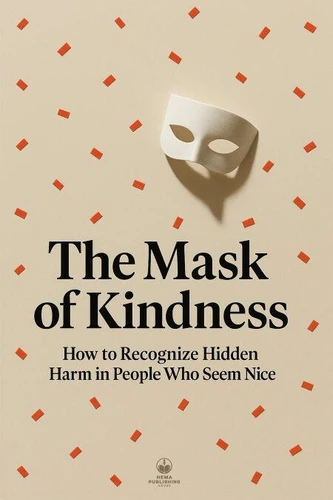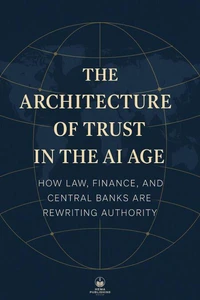Nouveauté
The Mask of Kindness - How to Recognize Hidden Harm in People Who Seem Nice
Par :Formats :
Actuellement indisponible
Cet article est actuellement indisponible, il ne peut pas être commandé sur notre site pour le moment. Nous vous invitons à vous inscrire à l'alerte disponibilité, vous recevrez un e-mail dès que cet ouvrage sera à nouveau disponible.
Disponible dans votre compte client Decitre ou Furet du Nord dès validation de votre commande. Le format ePub est :
- Compatible avec une lecture sur My Vivlio (smartphone, tablette, ordinateur)
- Compatible avec une lecture sur liseuses Vivlio
- Pour les liseuses autres que Vivlio, vous devez utiliser le logiciel Adobe Digital Edition. Non compatible avec la lecture sur les liseuses Kindle, Remarkable et Sony
 , qui est-ce ?
, qui est-ce ?Notre partenaire de plateforme de lecture numérique où vous retrouverez l'ensemble de vos ebooks gratuitement
Pour en savoir plus sur nos ebooks, consultez notre aide en ligne ici
- FormatePub
- ISBN8232953164
- EAN9798232953164
- Date de parution07/11/2025
- Protection num.pas de protection
- Infos supplémentairesepub
- ÉditeurHamza elmir
Résumé
Some people seem gentle, generous, and caring on the surface. They speak softly, smile warmly, and act supportive. Yet something inside you feels unsettled around them. You cannot point to anything specific, but the discomfort stays. This book explores that feeling. It reveals the subtle traits of people who appear kind yet quietly drain emotional strength, manipulate through politeness, and use warmth to influence and control.
True harm is not always loud; sometimes it lives behind courtesy, empathy performance, and quiet guilt. Inside, you will learn: The difference between real kindness and emotional strategy How false empathy and strategic warmth work Why some people help only to hold influence Signs of boundary crossing hidden behind "concern" How guilt, obligation, and emotional debt are created Why charm often disguises insecurity and power How intuition recognizes truth before logic does What genuine goodness looks and feels like This is a book about psychological clarity, emotional self-protection, and inner strength.
It does not teach suspicion; it teaches discernment. It does not make you colder; it makes you wiser. It helps you trust yourself again, especially when someone's behavior says "nice, " but your inner voice says "something is not right."If you have ever questioned your instincts around someone who seemed gentle on the surface but heavy in your presence, this book offers language, understanding, and confidence to protect your peace-without losing your compassion.
True kindness does not require confusion. Genuine goodness never demands a cost. Strength begins when you trust what you feel.
True harm is not always loud; sometimes it lives behind courtesy, empathy performance, and quiet guilt. Inside, you will learn: The difference between real kindness and emotional strategy How false empathy and strategic warmth work Why some people help only to hold influence Signs of boundary crossing hidden behind "concern" How guilt, obligation, and emotional debt are created Why charm often disguises insecurity and power How intuition recognizes truth before logic does What genuine goodness looks and feels like This is a book about psychological clarity, emotional self-protection, and inner strength.
It does not teach suspicion; it teaches discernment. It does not make you colder; it makes you wiser. It helps you trust yourself again, especially when someone's behavior says "nice, " but your inner voice says "something is not right."If you have ever questioned your instincts around someone who seemed gentle on the surface but heavy in your presence, this book offers language, understanding, and confidence to protect your peace-without losing your compassion.
True kindness does not require confusion. Genuine goodness never demands a cost. Strength begins when you trust what you feel.
Some people seem gentle, generous, and caring on the surface. They speak softly, smile warmly, and act supportive. Yet something inside you feels unsettled around them. You cannot point to anything specific, but the discomfort stays. This book explores that feeling. It reveals the subtle traits of people who appear kind yet quietly drain emotional strength, manipulate through politeness, and use warmth to influence and control.
True harm is not always loud; sometimes it lives behind courtesy, empathy performance, and quiet guilt. Inside, you will learn: The difference between real kindness and emotional strategy How false empathy and strategic warmth work Why some people help only to hold influence Signs of boundary crossing hidden behind "concern" How guilt, obligation, and emotional debt are created Why charm often disguises insecurity and power How intuition recognizes truth before logic does What genuine goodness looks and feels like This is a book about psychological clarity, emotional self-protection, and inner strength.
It does not teach suspicion; it teaches discernment. It does not make you colder; it makes you wiser. It helps you trust yourself again, especially when someone's behavior says "nice, " but your inner voice says "something is not right."If you have ever questioned your instincts around someone who seemed gentle on the surface but heavy in your presence, this book offers language, understanding, and confidence to protect your peace-without losing your compassion.
True kindness does not require confusion. Genuine goodness never demands a cost. Strength begins when you trust what you feel.
True harm is not always loud; sometimes it lives behind courtesy, empathy performance, and quiet guilt. Inside, you will learn: The difference between real kindness and emotional strategy How false empathy and strategic warmth work Why some people help only to hold influence Signs of boundary crossing hidden behind "concern" How guilt, obligation, and emotional debt are created Why charm often disguises insecurity and power How intuition recognizes truth before logic does What genuine goodness looks and feels like This is a book about psychological clarity, emotional self-protection, and inner strength.
It does not teach suspicion; it teaches discernment. It does not make you colder; it makes you wiser. It helps you trust yourself again, especially when someone's behavior says "nice, " but your inner voice says "something is not right."If you have ever questioned your instincts around someone who seemed gentle on the surface but heavy in your presence, this book offers language, understanding, and confidence to protect your peace-without losing your compassion.
True kindness does not require confusion. Genuine goodness never demands a cost. Strength begins when you trust what you feel.




